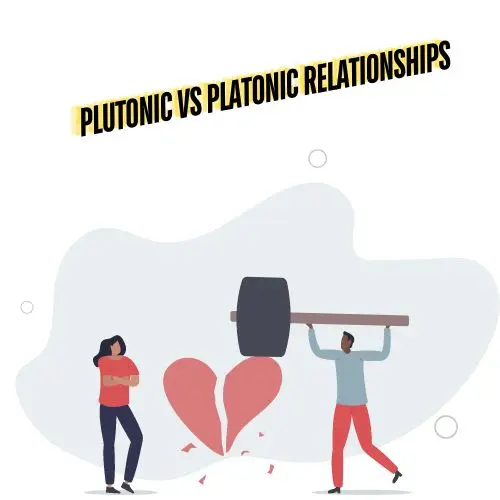Introduction
Relationships come in many forms, and knowing where different types fall on the spectrum is crucial. Recently, the terms ‘platonic’ and ‘plutonic’ have become more commonly used, but their specific meanings frequently get burdened. This article aims to clarify the important variations between these two kinds of relationships.
Whether you’re single, exploring options, or in a devoted partnership, recognizing the differences between platonic and plutonic relationships subjects. It facilitates the construction of healthful bonds by setting appropriate barriers and managing expectancies. So let’s begin via know-how of the fundamental data via this table:
| Relationship Type | Description |
|---|---|
| Platonic | Non-sexual relationships are based on emotional intimacy, trust and care for another person’s well-being and life goals without any romantic involvement. |
| Plutonic | It is a rarely used term that refers to sexual relationships without emotional involvement or commitment beyond physical intimacy. |
With this backdrop, let’s explore the core contrasts between platonic and plutonic relationships in greater detail:
Platonic Relationships

- Platonic relationships are very common friendships lacking romantic elements like kissing and dates. These deep connections are purely emotional in nature.
- The individuals share an affinity, care, genuineness, and depth to their bond beyond surface-level interactions. Open communication, trust and understanding are hallmarks.
- Partners support each other’s personal and professional growth goals through thick and thin. Their care comes without any strings attached or expectations of reciprocity in the physical realm.
- Compatible personalities, shared interests, and strong empathy, rather than just physical attractions, sustain platonic ties. Respect, loyalty, and commitment to the friendship keep it vibrant.
- While attraction may exist on some level, both parties actively curb any romantic advances to retain the valued emotional closeness without jeopardizing boundaries.
- Gender is not a barrier to platonic relationships, which empowers individuals to seek support from opposite-sex friends, too, without awkwardness or suspicion.
Plutonic Relationships

- Plutonic relationships comprise physical intimacy without the emotional investment expected from a significant other or committed partner.
- Beyond the sexual act itself, parties do not genuinely care about each other’s well-being or dreams or take a real interest in each other’s lives on a personal level.
- Lust, thrill-seeking, or validation from casual flings rather than a warm connection drive such transient dynamics that lack trust, loyalty, and responsibility toward the other person.
- Participants do not view each other as confidantes and drop contact easily once physical desires ebb away without coping with feelings of detachment.
- Consenting individuals may continue a friends-with-benefits dynamic for instant gratification without truly valuing the other’s emotional and social well-being.
- Gender stereotypes often play a role in some cases where men tend to seek plutonic encounters more commonly than women, usually interested in deepening bonds.
Key Differences in Perspective
Beyond the surface-level contrasts, it is also important to understand how platonic versus plutonic relationships shape one’s outlook differently. Here are some notable variations in perspective:
- Emotional fulfillment vs. physical fulfillment – Platonic partnerships leave one feeling cared for and supported wholesomely on an existential level. Meanwhile, plutonic encounters only temporarily satisfy physical cravings.
- Trusting confidant vs. casual acquaintance—Platonic friends view each other as trusted allies to rely on through changes. But plutonic partners remain unfamiliar with each other’s emotional vulnerabilities.
- Longevity of bond vs. short-lived dynamics—Platonic relationships often withstand life transitions, standing the test of time through thick and thin. At the same time, plutonic liaisons fizzle out quickly once the initial spark dies down.
- Valuing personalities vs. focusing on physical traits: Platonic partners see beyond looks and age to truly appreciate each other’s character, virtues, and uniqueness. Plutonic interests highlight beauty and bodies primarily.
- Reciprocal nurturing vs. taking the other for granted: Platonic friends respect, learn from, and nourish each other volitionally. But plutonic partners handle the other to fulfill selfish drives, leaving emotional needs unmet.
Navigating Both Dynamics Wisely
- While plutonic liaisons are natural for some, discussing boundaries and protecting the emotional well-being of oneself and partner is important to avoid messy entanglements.
- Platonic relationships demand emotional labor like trust-building but enrich lives immensely if both nurture reciprocally with consent and care over selfish desires.
- Knowing when underlying attractions risk shifting a trusted platonic dynamic requires self-awareness and willingness to acknowledge feelings respectfully to friends.
- In the long run, prioritizing emotional bonds preserved through platonic ties outweighs fleeting thrills from plutonic encounters detaching from responsibilities.
- Consciously distinguishing the two aids in seeking fulfillment in lasting partnerships, standing true to one’s needs and principles, and providing clarity for all involved parties.
Understanding and respecting the nuances between platonic and plutonic relationships enable individuals and society to foster healthier interpersonal ties. While physical needs have a place, emotional well-being from genuinely caring for people beyond appearances and intimacy deserves more emphasis. Making informed choices empowers all to experience relationship satisfaction.

